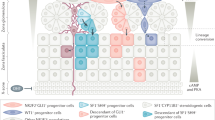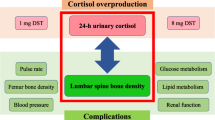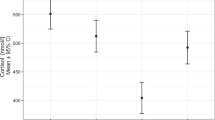Abstract
ELEVATION of the blood adrenaline-level, whether by intravenous infusion or in response to stress stimuli, leads to an increase in the concentration of adrenocortical hormones in blood1–4. It is believed that this increase is mediated by the anterior hypophysis, which responds to the increased blood adrenaline levels by releasing adrenocorticotrophic hormone.
This is a preview of subscription content, access via your institution
Access options
Subscribe to this journal
Receive 51 print issues and online access
$199.00 per year
only $3.90 per issue
Buy this article
- Purchase on SpringerLink
- Instant access to full article PDF
Prices may be subject to local taxes which are calculated during checkout
Similar content being viewed by others
References
Vogt, M., J. Physiol., 103, 317 (1944).
Long, C. N. H., and Fry, E. G., Proc. Soc. Exp. Biol., N.Y., 59, 67 (1948).
Pickford, M., and Vogt, M., J. Physiol., 112, 133 (1951).
Long, C. N. H., in “Symposium on Shock” (U.S. Army Medical Service Graduate School, Washington, 1951).
Robinson, R., and Munro, A. F., Acta Physiol. Scand. (in the press).
Norymberski, J. K., Stubbs, R. D., and West, H. F., Lancet, i, 1276 (1953).
Author information
Authors and Affiliations
Rights and permissions
About this article
Cite this article
ROBINSON, R. Excretion of 17-Ketogenic Steroids in Subjects with Complete Transverse Lesions of the Spinal Cord. Nature 181, 484 (1958). https://doi.org/10.1038/181484a0
Issue date:
DOI: https://doi.org/10.1038/181484a0



